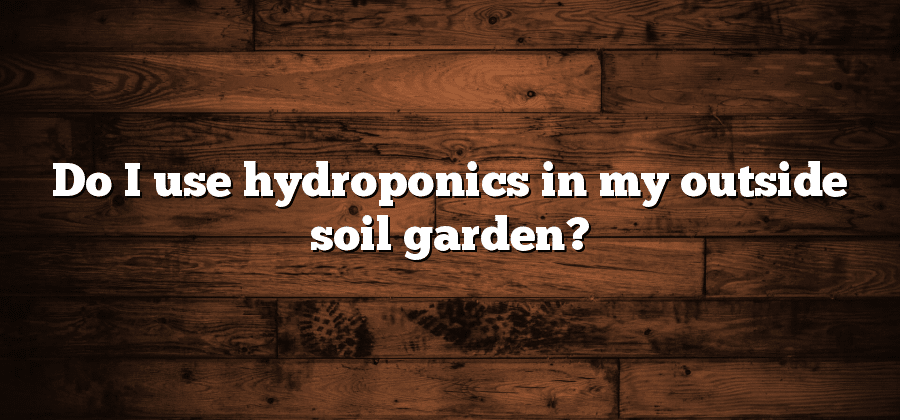Benefits of Hydroponics in Outdoor Gardening
One of the main benefits of using hydroponics in outdoor gardening is the ability to have complete control over the growing environment. With traditional soil gardening, factors such as soil quality, pH levels, and nutrient availability can vary greatly from one area to another. However, with hydroponics, growers can create an optimal environment for their plants by precisely controlling the water, nutrient, and light levels. This ensures that the plants receive the perfect amount of resources they need to thrive, leading to faster growth and higher yields.
Another advantage of hydroponics in outdoor gardening is the ability to conserve water. Traditional soil gardening requires a significant amount of water to adequately hydrate the plants and maintain the health of the soil. In hydroponics, water is continuously recirculated through the system, significantly reducing water usage. Additionally, techniques such as drip irrigation and nutrient film technique (NFT) can be used to further minimize water wastage. This water-saving feature not only benefits the environment by reducing water consumption but also saves growers money on water bills.
Alternative Techniques for Outdoor Soil Gardening
One alternative technique for outdoor soil gardening is raised bed gardening. Raised bed gardening involves creating a designated area for planting that is elevated above the ground. This technique is beneficial because it allows for better control over soil quality and moisture levels. By using high-quality soil mixtures and incorporating compost and organic matter, gardeners can create optimal growing conditions for their plants. Additionally, raised beds provide improved drainage, which reduces the risk of waterlogged soil and root rot. This technique also makes it easier to manage and maintain the garden, as the raised beds provide clear boundaries for planting and weeding.
Another alternative technique for outdoor soil gardening is companion planting. Companion planting is the practice of growing different plants together that have mutually beneficial relationships. Some plants naturally repel pests, while others attract beneficial insects that can help to control pests in the garden. By strategically planting compatible plants, gardeners can create a natural pest management system without the need for chemical pesticides. Additionally, some companion plants can help to improve soil fertility by fixing nitrogen or enhancing nutrient uptake. This technique promotes biodiversity in the garden and can result in healthier, more productive plants.
Understanding the Basics of Hydroponics for Outdoor Gardens
Hydroponics is a modern and innovative technique that is gaining popularity among outdoor gardeners. It involves growing plants without the use of soil, instead relying on a water-based solution to deliver essential nutrients directly to the plant’s roots. This method offers several advantages over traditional soil gardening, making it worth considering for anyone looking to enhance their gardening experience.
One of the key benefits of hydroponics in outdoor gardening is the precise control it allows over nutrient delivery. By using a carefully calibrated nutrient solution, gardeners can ensure that their plants receive the exact amount of minerals and nutrients they need for optimal growth. This eliminates the guesswork and potential inconsistencies inherent in soil-based gardening, resulting in healthier plants and increased crop yields. Furthermore, hydroponics eliminates the need for traditional weeding, as there is no soil to host unwanted plants. This saves gardeners time and energy, allowing them to focus on other aspects of gardening, such as pest management and plant maintenance.
Improving Crop Yield with Hydroponics in Outdoor Gardens
One key benefit of using hydroponics in outdoor gardens is the potential for significantly improving crop yield. Traditional soil gardening often faces challenges such as poor water drainage, nutrient deficiencies, and pest infestations, all of which can negatively impact plant growth and yield. With hydroponics, these issues can be minimized or even eliminated, leading to healthier and more productive plants.
In hydroponics, plants are grown in a nutrient-rich water solution rather than traditional soil. This allows for more precise control over the plant’s environment and nutrient intake. By delivering nutrients directly to the roots, plants can absorb them more efficiently, resulting in faster growth rates and larger yields. Additionally, the absence of soil reduces the risk of diseases and pests, further promoting the health and productivity of the plants. With careful monitoring and adjustment of factors such as pH levels and nutrient concentration, hydroponics enables gardeners to optimize conditions for crop growth and maximize yield potential.
Challenges and Solutions for Implementing Hydroponics in Outdoor Gardening
Challenges are an inevitable part of implementing hydroponics in outdoor gardening. One of the major challenges faced is the unpredictable weather conditions. Unlike indoor hydroponics, outdoor gardens are subject to varying temperatures, excessive rainfall, and strong winds, which can impact the stability and health of the hydroponic system. Additionally, pests and diseases present a constant threat to outdoor gardens, as they can easily infest and damage crops.
However, solutions exist to overcome these challenges and ensure successful implementation of hydroponics in outdoor gardening. Installing proper weather protection measures, such as greenhouse structures or shade cloths, can shield the hydroponic system from extreme temperatures, rain, and wind. Implementing pest and disease management strategies, such as regular monitoring, integrated pest management techniques, and biological controls, can help minimize the risks and prevent potential infestations. By identifying and addressing these challenges, outdoor gardeners can harness the numerous benefits of hydroponics while ensuring the longevity and productivity of their crops.






